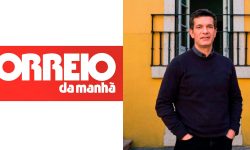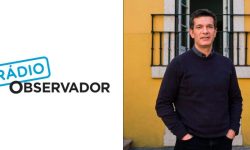We badly need decent people to help us think decently. We are in dire need of bold people to help us think boldly. But, more than anything, we are in great need of decent and bold people who can help us to live decently and boldly. That is why the death of Luís Moita deprives us of such an important support not only for the personal life of many, but for the collective life of all.
In this time of hurried labels that put us in compartmentalised drawers, the easiest thing to do is to put Luís Moita in the drawer of the “progressive Catholics”. He was, as we well know. One of the most notable and influential. But this label would erase much of Luís Moita’s thought and intervention. And yet, perhaps he did not mind being seen like that, because for him it meant precisely an irradiation, a strong contagion, of all the fields of his public action and the expression of his thought for the primacy of loving fraternity as a guide for our relational condition. As a priest, as an anti-fascist and anti-colonial activist, as a thinker of Ethics, as a democracy militant, as an academic of International Relations, Luís Moita has always been the same cultivator of that primacy, with a rare coherence and an even rarer elevation.
In his last lesson at the Autonomous University of Lisbon, in July 2019, dedicated precisely to the concept of relation, Luís Moita had to show how the relational dimension is a continuum that structures all reality: “The idea of relation is a key concept that can cross all our fields of knowledge, from subatomic particles to the international system and humanity as a whole, and is something that makes us understand reality better and, on the other hand, makes us responsible towards it.” For him, ethics is thus the grammar of decent relationship. In a particularly luminous text of 2002[1], he situated what he called the “dramatism of ethics” in that choice between building up and destroying one another: “The relational process, which could be humanising, sometimes becomes a factor of dehumanisation. Ethics confronts us with the enigma that we can destroy each other (…) The space of ethics is the territory of freedom, of the possibility of choice, of the capacity to give answers. Ethics is not hygiene, it is not aesthetics. It is the desire and the imperative for the quality of the values present in human relationships. Relationship and responsibility – this was the thread that ran through the entire arc of his life and thought. Luís Moita chose the side of care and witnessed it not only in his thinking but in the quality of the relationship he cultivated with each of those who crossed his path.
Let us return then to the label of progressive Catholic. According to Jorge Wemans,[2] shortly before his death, Luis Moita expressed his dissatisfaction with the “doctrinal yoke” that the Catholic Church had created over the centuries and that obscured the divine rebellion of Jesus. 3] This yoke, said Luís Moita, nourishes “a casuistic discourse on all aspects of life” and obscures the Church’s sole raison d’être: “to make people happy”, so that “everyone can live in fullness”. That was the progressivism of the Catholic Luís Moita. First and foremost, of Father Luís Moita. What made him such a progressive was a choice (ethical, of course): between fidelity to the primacy of loving brotherhood drunk in Jesus of Nazareth and subservient quietism to an ankylosed hierarchical structure closely committed to fascism and colonialism, Luís Moita chose the former and repudiated the latter. It was this that placed him at the centre of the movement that publicly fought for the resignation of Cardinal Cerejeira, in the theological ebullience of the Seminar of Olivais and that would later lead him to be one of the main promoters of the vigils for peace in the Church of S. Domingos, in the transition from 1968 to 1969, and of the Chapel of the Rato, in the transition from 1972 to 1973. This was what made him leave the priesthood without ever abandoning the Christian call to liberation in solidarity.
Perhaps the two vigils signal the assumption of the concern for peace as the strongest realisation of the ethical grammar of relationship. The sense of Luís Moita’s anti-colonial activism is not different. One cannot understand his anti-colonial commitment disconnected from what had been his trajectory as a believer and as a priest. From the Anticolonial Bulletin – of which he was responsible with Nuno Teotónio Pereira – to the creation and affirmation of CIDAC (Centre for Information and Documentation Anticolonial) between 1974 and 1989, through his commitment in the Lelio and Lisli Basso Foundation for the Rights of Peoples, it was the ethical record of peace, made as much of silence of weapons as of the autonomy of peoples and social justice, which founded the anti-colonial struggle of Luís Moita.
It was the same triangular foundation – relationship, responsibility, peace – that encouraged his passion for the area of International Relations, of which he became a leading name in Portugal from the 1980s onwards. The studies of peace and war – both in “civilian” education and in higher military schools – allowed him to test the limits of the ethical imperative of peace. International politics is read by the traditional schools of the discipline of International Relations as a terrain canonically governed by the primacy of interests over values. Without falling into the traps of the cosmopolitanism of the triumphant and of liberal institutionalism, Luís Moita faced the challenge of thinking international politics as a field of ethical choices, distancing himself from the argumentation that subordinates values – or rather, subordinates some values – in the international arena, counterposing a normative look, admittedly committed to horizons of peace and global justice. “Values and interests often clash, but we cannot give up trying to make them converge”, he wrote in 2009[4]. Therefore, international politics is, in Luís Moita’s thinking, a particularly challenging territory in which the affirmation of our responsibility as a human community is played out and, therefore, of the choices we also make on that scale: peace or war, domination or self-determination, the network or the pyramid, rights or rule, our common home or empire.
The choice to be community was always, for him, our way of corresponding to the ontological anteriority of the plural over the singular. “We exist because of each other, it is the fabric of our relationships that constitutes us as persons. Before being individuals, we are participants in a community that makes us ourselves,” he maintained in his last lesson. A valuable and courageous lesson, in this time of exaltation of individualism and its warlike expressions on all scales. Against this legitimisation of the destructive relationship, we are in great need of decent and bold people who can counterbalance it with a creative relationship. That is why we will miss Luís Moita so much.
[1] “The ethical conditions of social intervention”, communication to the Congress of the Portuguese Social Service Association. [2] “Luís Moita (1939-2023): ‘Para que as pessoas sejam felizes'”, Sete Margens, 28.1.2023 [3] José Veiga Torres, Desafio aos cristãos e a outras gentes. Coimbra: Lápis de Memórias, 2018 [4] “Ethics and politics: a problematic relationship”, Colloquium Ethics and the Contemporary World, Lusophone University of Humanities and Technologies (16.10.2009 )






